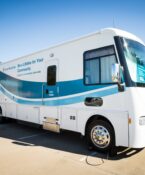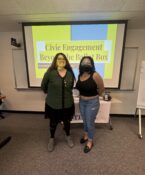Pharmacy student spends eye-opening rotation in rural Montana
By Jan Jarvis
 Pharmacy student Rychlend Martin-Horne never imagined she would come face-to-face with a huge black bear and her cubs.
Pharmacy student Rychlend Martin-Horne never imagined she would come face-to-face with a huge black bear and her cubs.
The frightening experience during a 12-mile hike to Cracker Lake in Montana was not exactly what she expected from her six-week pharmacy rotation, but it was memorable.
“I’m a city girl,” she said. “I never thought I’d like working in rural America or let alone find myself in Browning, Montana. But this was probably one of the best decisions I made and a very humbling opportunity.”
For Martin-Horne, her rotation on the Native American Blackfoot Reservation was not the typical experience she would get at a community drug store or city hospital.
“I was in the middle of nowhere,” she said. “But I could see how much of an impact you can have in a rural area.”
While working on the reservation, she said she realized how tight-knit the community was and the pride people took in preserving their culture and traditions.
She was given an extensive orientation overviewing the customs of the residents. And she said she got an eye-opening review of the health issues specific to the reservation, such as high drug and alcohol abuse, hepatitis C and the opioid epidemic within the community, she said.
The reservation is located on 18 million acres of land. The community hospital acts as the main pharmacy for all the residents’ prescriptions.
“When someone needs a prescription, they can’t just go to corner pharmacy,” Martin-Horne said. “We were always filling prescriptions while I was there.”
Each year six to eight pharmacy students do a rotation in a rural area or in public health service, said Lisa J. Killam-Worrall, PharmD, Associate Professor of Pharmacotherapy and Associate Dean for Pharmacy Curriculum. Rotations are offered on Native American reservations in Montana, New Mexico and Oklahoma.
“Students get the chance to really help the population,” she said. “They get to see people in the hospital, but they also get to interact with the community as a whole.”
Martin-Horne arrived in May to high winds and light snow and left six weeks later in early spring-like weather. In her free time, she hiked throughout Glacier Park, participated in a sweat lodge ceremony and befriended the community dogs that roamed freely on the reservation.
The experience was so rewarding that Martin-Horne said she is considering a pharmaceutical career in a rural community-like setting when she completes her degree. She might even return to the Blackfoot reservation.
“It turned out to really be a great rotation for me, and I wish that everyone could have an experience within this practice setting,” she said. “This experience not only showed me another way of life. But how I could make an impact as a future health care provider.”
![Uyen Sa Nguyen Scaled[58]](https://www.unthsc.edu/newsroom/wp-content/uploads/sites/16/Uyen-Sa-Nguyen-scaled58-145x175.jpg)




Social media